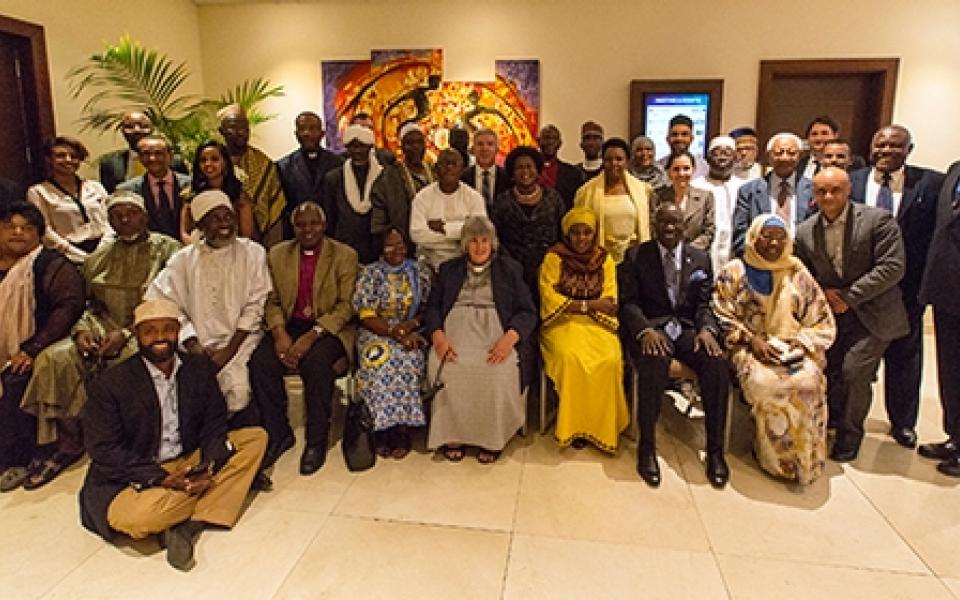
Greetings of peace and blessing from URI-Africa.
URI took part at the meeting on the role of religious actors from Africa in preventing incitement to violence which could lead to atrocity crimes.
The meeting took place in Addis Ababa, Ethiopia, from 9-11 May 2016 at Radisson Blu Hotel and co-organized by the United Nations Office on Genocide Prevention and the Responsibility to Protect, the International Dialogue Centre (KAICIID), the World Council of Churches, and the Network for Religious and Traditional Peacemakers.
Two URI Cooperation Circles took part in the meeting:
- From Nigeria, The Interfaith Mediation Centre, represented by the famous Imam and Pastor
- Inter-Religious Council of Ethiopia
Religious actors representing different faiths from a broad range of countries participated in the meeting, including Burundi, the Central African Republic, Chad, Cote d'Ivoire, the Democratic Republic of the Congo, Ethiopia, Guinea, Kenya, Liberia, Malawi, Nigeria, Rwanda, Somalia, South Africa, South Sudan, Sudan, Tanzania, Uganda and Zimbabwe. The participants reflected together over two days to develop a strategy to prevent and counter incitement to discrimination, hostility and violence in the region.
As you noticed in recent years, there has been a marked increase in atrocity crimes. The violence that leads to these crimes often starts with an escalation of tensions between ethnic and religious communities, which is often preceded and triggered by “hate speech” and incitement to violence.
It is with this fact in mind that URI-Africa signed an agreement with African Media Initiative last year to address the issue of hate speech in the continent.
As key influencers and voices of authority in their communities, religious actors have a key role to play in preventing incitement to violence, and this is exactly what the participants of the conference have been discussing.
At the meeting, participants learned to recognize what constitutes incitement, to identify best practices and lessons learned by peer religious leaders and actors for the prevention of incitement, and to examine ways in which religious actors can act quickly and decisively to identify, counteract and prevent incitement, particularly in situations where there is an imminent risk of violence.
The meeting also explored and discussed at length the role of religious actors from Africa in preventing and combating the radicalization of youth and in engaging with radicalized youth, including those who come back from conflict areas, for the purposes of rehabilitating and reintegrating the youth into society.
The meeting was opened with the remarks from His Excellency Adama Dieng, Special Adviser to the Secretary General of the United Nations on the Prevention of Genocide; His Excellency Ambassador Alvaro Albacete, Deputy Secretary General; KAICIID Dialogue Centre; and Rudelmar Bueno de Faria, Representative to the United Nations in New York at World Council of Churches.
In his opening remarks, H.E. Adama Dieng, Special Adviser to the Secretary General of the United Nations on the Prevention of Genocide, said, “It is tragic that, in the 21st Century, we are witnessing so much violence, including conflicts and atrocities allegedly committed in the name of religion. It is a sad state of affairs when the very same values which inform our greatest human institutions, instruct our noblest human aspirations, and underline the Universal Declaration of Human Rights, are used to justify the infliction of suffering, pain and horror. This is why the participation of all you here at this meeting is not just for purposes of consultation. We are gathered as active seekers of peace, healing and resolution. The position that I hold as Special Adviser to the United Nations Secretary-General was established to provide early warning of situations that could lead to genocide and related crimes and to advocate for action to prevent these crimes in situations at risk. It is my firm belief, and that of the United Nations, that you as religious leaders have a fundamental role to play in this regard, given your spiritual leadership and your influence over so many different and important communities. One of the key triggers to violence that can lead to atrocity crimes is the kind of speech in public discourse and in the media that constitutes incitement to violence. Any advocacy of national, racial or religious hatred that constitutes incitement to discrimination, hostility or violence, is prohibited under international law. This kind of discourse is a frequent precursor to violence that targets communities based on their religious or ethnic identity.”
On the occasion of the conference, I had a meeting with the Special Adviser to the Secretary General of the United Nations on the Prevention of Genocide on how to work in partnership with URI and its Cooperation Circle members in 95 countries.
May Peace Prevail on Earth.
